Last Updated on August 8, 2022
Every driver knows how it’s supposed to feel when they hit the brakes. So, when something doesn’t feel right, it’s essential to track down the problem’s cause and fix it right away.
The good news is that while spongy brakes are a common concern, it’s usually a pretty straightforward fix, and if you know what you’re doing, it typically doesn’t have to cost you a ton of money.
Below we’ll break down the most common causes for spongy brakes, then walk you through everything you need to know to help diagnose it if you have a problem in the first place!
Top 6 Reasons for Spongy Brakes
Spongy brakes aren’t just annoying – they’re dangerous. If you’re feeling anything weird going on when you step on the brakes, check out the following five reasons that it might be happening.
#1 – Air In the Brake System
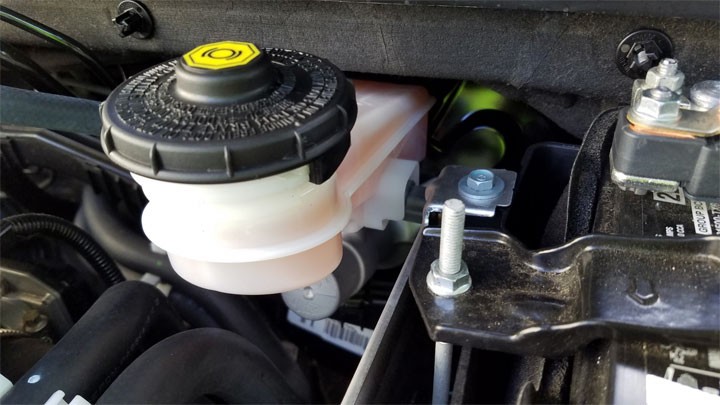
Having air in the brakes is by far the most common reason for spongy brakes. But just as crucial as getting the air out is determining how it got there in the first place. If you recently had work done to the brake system, that’s a likely culprit.
Otherwise, you probably have a leak somewhere that you need to look into. Start by bleeding the brakes and see if the problem continues. If the problem persists after bleeding the brakes, keep reading.
#2 – Damaged Brake Lines
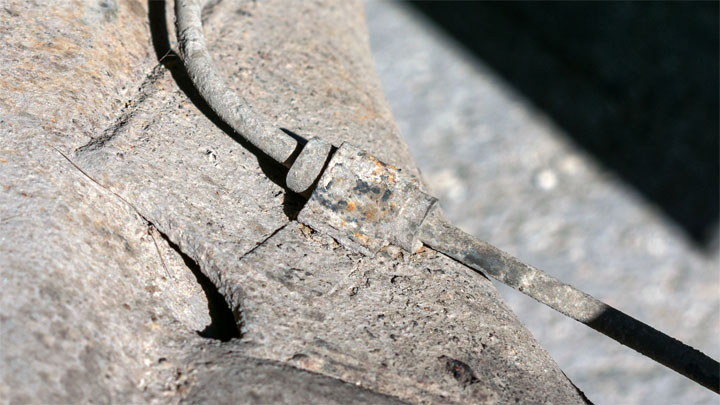
While there are plenty of components that can get damaged, the brake lines are the most common. This is more common in coastal towns and states with lots of rock salt on the road. Both of these things cause corrosion, and the brake lines have no protection from any of it.
The longer it goes on, the more likely they are to rust, leading to leaks that allow brake fluid to escape and air to enter the system.
#3 – Old Brake Fluid
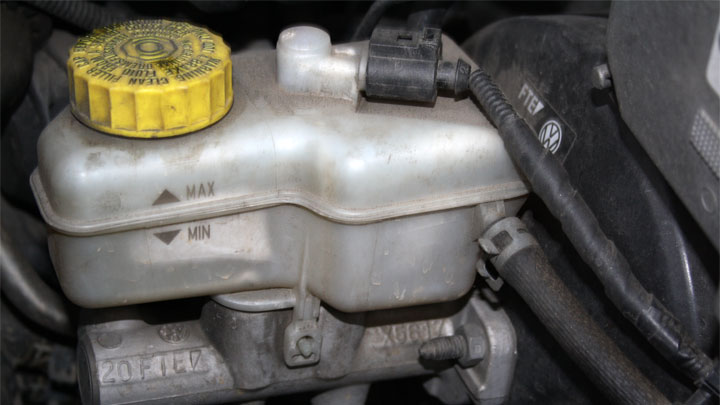
While brake fluid can last a while, it’s not something that can last forever. While some manufacturers have set service intervals ranging from 20,000 to 30,000 miles, the truth is a little more complicated.
That’s because as long as the brake system doesn’t have any leaks, the fluid itself can last over 100,000 miles. But as soon as air gets introduced to the system, it starts to oxidize and add moisture to the fluid.
This is detrimental to your brake system. The more moisture that gets added, the spongier your brakes will feel, which is a telltale sign that you need to flush the system and change your fluid.
Related: DOT 3 vs DOT 4 Brake Fluid
#4 – Damaged Master Cylinder
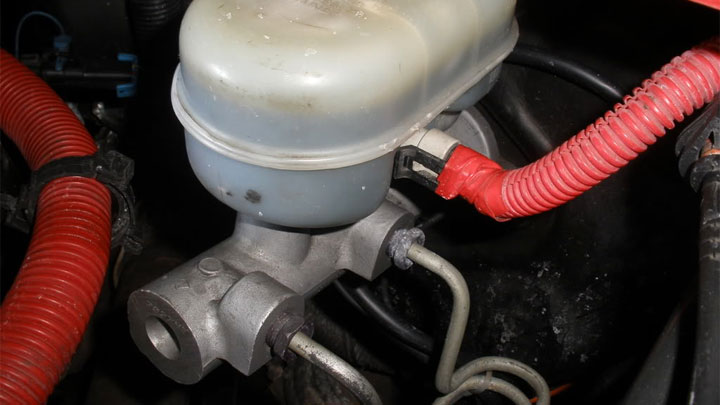
While your brake lines can rust and leak, there are seals throughout your master cylinder that keeps everything working the way it should. If you have a broken seal in the master cylinder, one of two things can happen depending on the leak’s location.
First, brake fluid can leak out of the cylinder, which can lead to spongy brakes. Second, if the leak is above where the brake fluid sits – like at the cap – air will get into the system.
Not only can this air cause problems, but the moisture that it attracts will deteriorate the brake fluid—both result in spongy brakes. You’ll have to fix the leak and flush the brake fluid to keep the problem from coming right back.
#5 – Damaged Brake Calipers
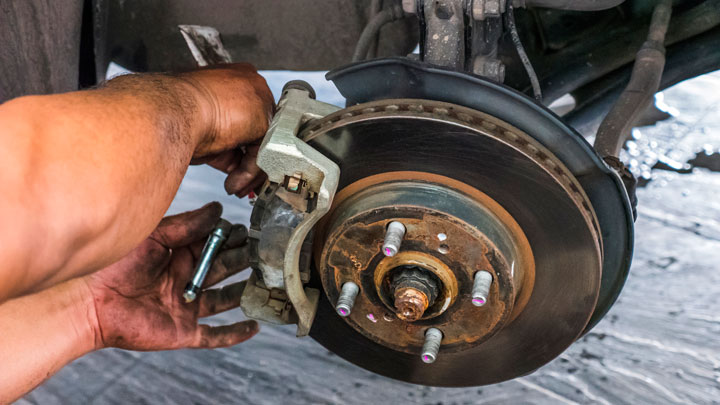
Another common area to have a leak is around the brake calipers. The brake pistons have seals that keep the fluid where it’s supposed to be, but a leak can result if those seals start to break down.
While this isn’t super common, it’s a big problem if it does. Not only will you have spongy brakes, but you’ll also have low brake fluid and brake fluid around the rotors and brake pads.
If you have a leaking brake caliper, you need to get it fixed immediately.
See Also: Sticking Brake Caliper (Symptoms/Causes)
#6 – Leaking Brake Booster
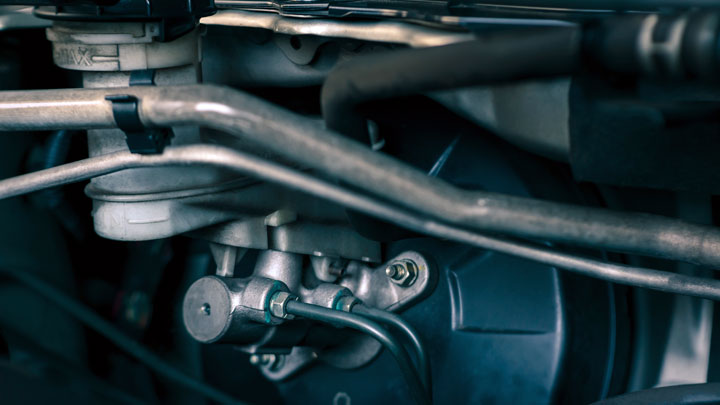
Another critical component in your vehicle’s braking system is the brake booster. The brake booster amplifies the amount of force you generate by pressing on the brake pedal.
While this is a helpful feature, if any of the seals start to fail in a hydraulic type brake booster, there’s a slight chance you may end up with what seems like spongy brakes but is in essence a drop in brake pressure as you hit the pedal.
Read Also: Faulty Brake Booster Symptoms
Is It Safe to Drive With a Spongy Brake Pedal?
If you have spongy brakes, it is NOT safe to drive, and you need to repair the underlying fault as soon as possible.
Spongy brakes are one of the most dangerous problems your vehicle can have. It’s indictive a deeper problem, and more importantly, it prevents you from stopping as quickly as you should.
Spongy brakes could mean that you have a leak, and small leaks can turn into a big one with just one push of the brakes.
If your leak turns into a blowout, you’ll have a complete loss of brake pressure. It won’t just take you longer to stop – you won’t be able to stop at all!
Even if your brakes aren’t leaking, spongy brakes mean that there is air in the system. The softness you feel while pressing the pedal is air hitting the caliper – when this happens, your brakes aren’t working.
It’s going to take you longer to stop, and it’s just going to get worse until you fix it.
Related: 5 Reasons Brakes Can Lock Up
Diagnosing a Soft Brake Pedal
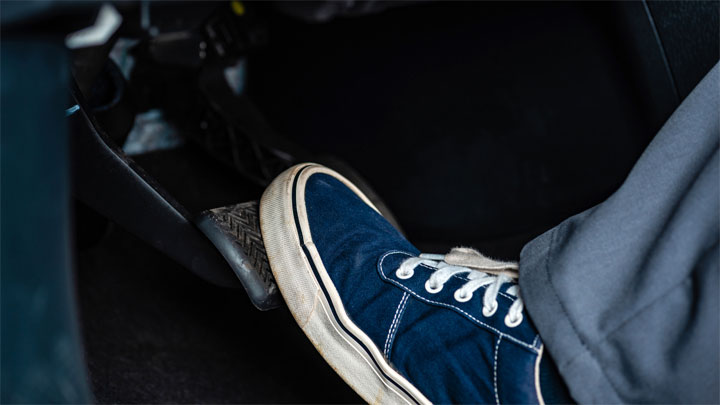
When pushing on the brakes, you should feel solid pressure from start to finish. If it feels as though the brake pedal’s pressure is changing when you press the brakes or if the brakes feel mushy, you have a spongy brake pedal.
Spongy brakes feel like squishy brakes, and it means the same thing.
There is an additional test you can conduct to try and locate the source of the problem. One of the best tests you can perform is to turn the key off and pump the brakes a few times. Once the pedal gets hard, push down on the brakes.
If the pedal starts to sag to the floor after this, you have a leak somewhere in the system, and you know the problem is deeper than just a little air you need to bleed out of the system.

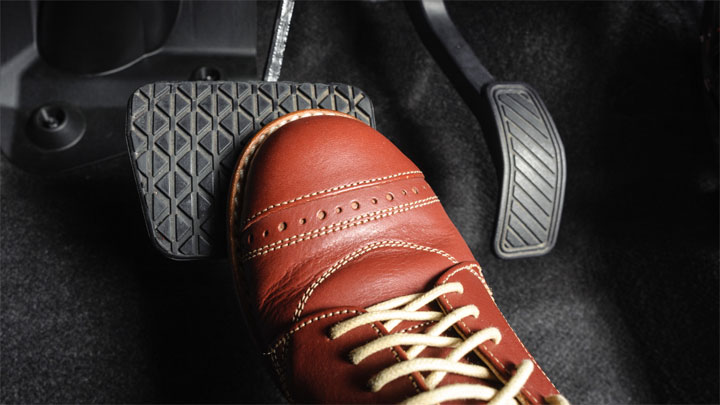
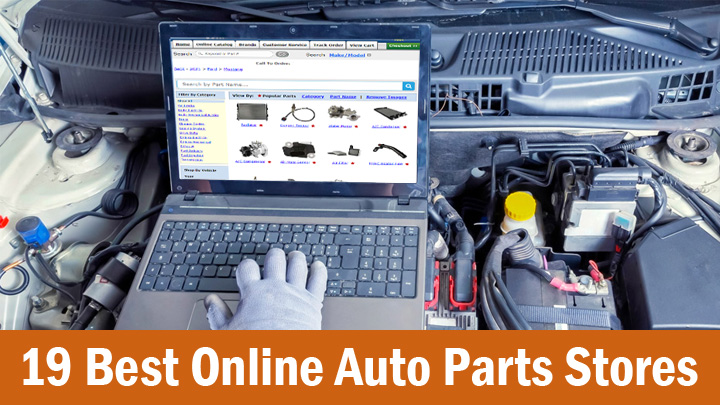

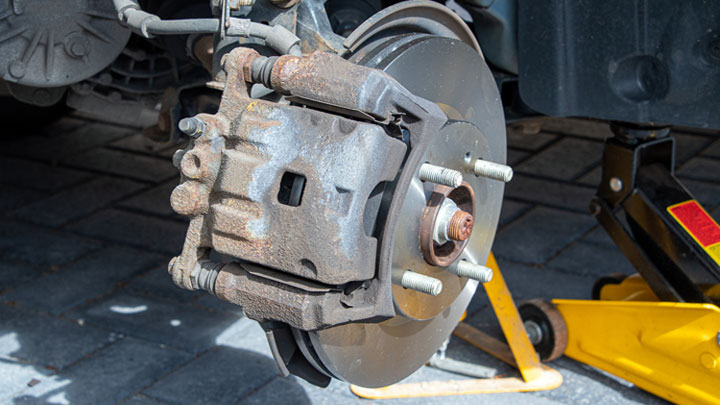
i have disc in the front new pad, new hose new calipber both side
new proportion valve with centered and locked shuttle valvle
new shoes and wheel cylinders in the back
all new fluid
spongy pedal bleed all ways still very spongy and low pedal at a loss help, brian doyle
What is the year, make, and model of the vehicle? Have you checked the brake master cylinder?
My 2009 Honda AWD CR-V brake pedal started getting soft and traveling closer to the floor. If I pump the brakes the pedal gets firm until braking again. I bled the brakes and noticed some air bubbles, flushed and replaced fluid with Prestone DOT3. About 2-3 weeks later the problem returned. A shop mechanic checked, found air bubbles in the front, replaced the front calipers, the problem returned again in about 2-3 weeks. I see no leaks at the master cylinder, booster, calipers or lines (as much as I can see of them). I’ve done your recommended booster tests, checks OK. Any further ideas would be appreciated.
Double check that all connections are tight (any junction between hard lines, calipers, master cylinder, etc). Don’t forget the bleeder screws at all four corners.
Thank you Sean. Could this be a master cylinder problem? My local mechanic shop finds no leaks, suggests replacing the master cylinder.
It’s possible. That’d be high on the list of things I’d try next.
Check your master. There is a residual check valve that keeps static pressure on your rear brakes, it keeps a static pressure on the wheel cylinder to allow front disc and rear drum brakes to come at the same time by not having to overcome the rear spring pressure. No static pressure allows rear cylinders to collapse allowing air to seep in.
2010 mercury milan. has new brake pads, brakes were bled, no visible leaks.
what could be the problem? brake pedal goes nearly to floor, little braking action
I guess the next thing I would check would be the rubber brake hoses. Make sure none of them are swelling or doing anything strange when you press on the brakes.
I would also double check that the brakes were bled properly and that there is no air in the lines, especially if you have ABS. Air can get trapped inside the ABS module and often requires a professional to properly bleed.
It is physically impossible for a faulty brake booster to cause a spongy pedal. When the booster first begins to fail, it’s ability assist in braking begins to degrade.
When the booster is not providing enough assist the pedal will actually start to feel much harder than before because with less boost the same pedal pressure produces less pedal travel.
I am a mechanic and can’t think of a scenario where it could cause a spongy pedal. If anyone could enlighten me, please do so because I would hate to be wrong and not know it.
It’s been a while since I wrote this article but I think what I was trying to get at is a hydro-brake booster.
However, looking back I should’ve provided a little more clarification because it is correct that a traditional vacuum brake booster can’t lead to spongy brakes and the current explanation isn’t all that clear on it.
Hydro-brake boosters can suffer from two problems that an amateur could diagnose as spongy brakes, although a professional mechanic would likely only diagnose one of the conditions as “spongy” and it’s typically pretty easy to rectify.
First, there can be air in the system. This is more common after replacing any components in the power steering system – including the hydro-brake booster itself. Compared to bleeding brakes getting the air out of the power steering system is generally pretty easy, even if it can be a bit more time-consuming.
Second, there could be a leak in the hydro brake booster. This isn’t going to lead to true “spongy” brakes, but it will lead to a drop in brake pressure as you hit the pedal, especially if you hold the pedal down. I think this is more what I was trying to get at without diving too far into the nitty gritty details of each system. An amateur could very easily mistake this for spongy brakes.
There’s no doubt that if your vehicle has spongy brakes, 99.9 percent of the time it’s because there’s air in the system. Even every other “cause” I listed simply introduces air into the system one way or another – which creates the spongy brakes.
2010 Ford edge, changed brake booster. After changing bled the brakes no pedal no pressure. Replaced master cylinder, had brakes but after a few minutes front brakes locked up. Replaced both again with new master and reman booster and back to no pedal. Bled a qt of fluid through and didn’t do anything to the calipers and didn’t have brake problems before changing just felt the pedal sticking when coming back up causing brake lights to stay on.
I wonder if you have a bad brake hose that is preventing fluid from returning back up toward the master cylinder. That could potentially make it so the ABS can’t do its job, and one or more calipers would just lock as you’ve described.
Otherwise, I’m not really sure what’s going on here. What was the initial problem you were trying to solve by replacing the brake booster?
Toyota Camry 2005 with ABS. Brake pedal is too soft and goes to floor. My state inspection failed due to this. Tested master cylinder on bench and in the car, its working perfectly. Flushed and bleed the brake fluid from all 4 wheels, no cure. Noticed an interesting thing, I pinched driver side front brake hose, which brings the pedal to normal (ie not spongy). I thought the brake caliper has some issue, the piston was seized, so I serviced the brake caliper, and put it back, bleed the air and un-pinched the line. The spongy brake returned. Pinching passenger front side hose also brings the pedal to solid. The brake hoses appears to be good.
I haven’t touched the ABS module, May be its faulty, or needs bleeding, but I don’t want to get that route just yet. Thoughts anyone?
Is there a chance you could’ve gotten air in the ABS lines? It might be a good idea to take the car to a shop to have them bleed the entire system (ABS included). Bleeding ABS requires a special tool that puts the ABS system in a bleed state. This is not possible for a home mechanic without a professional scan tool.